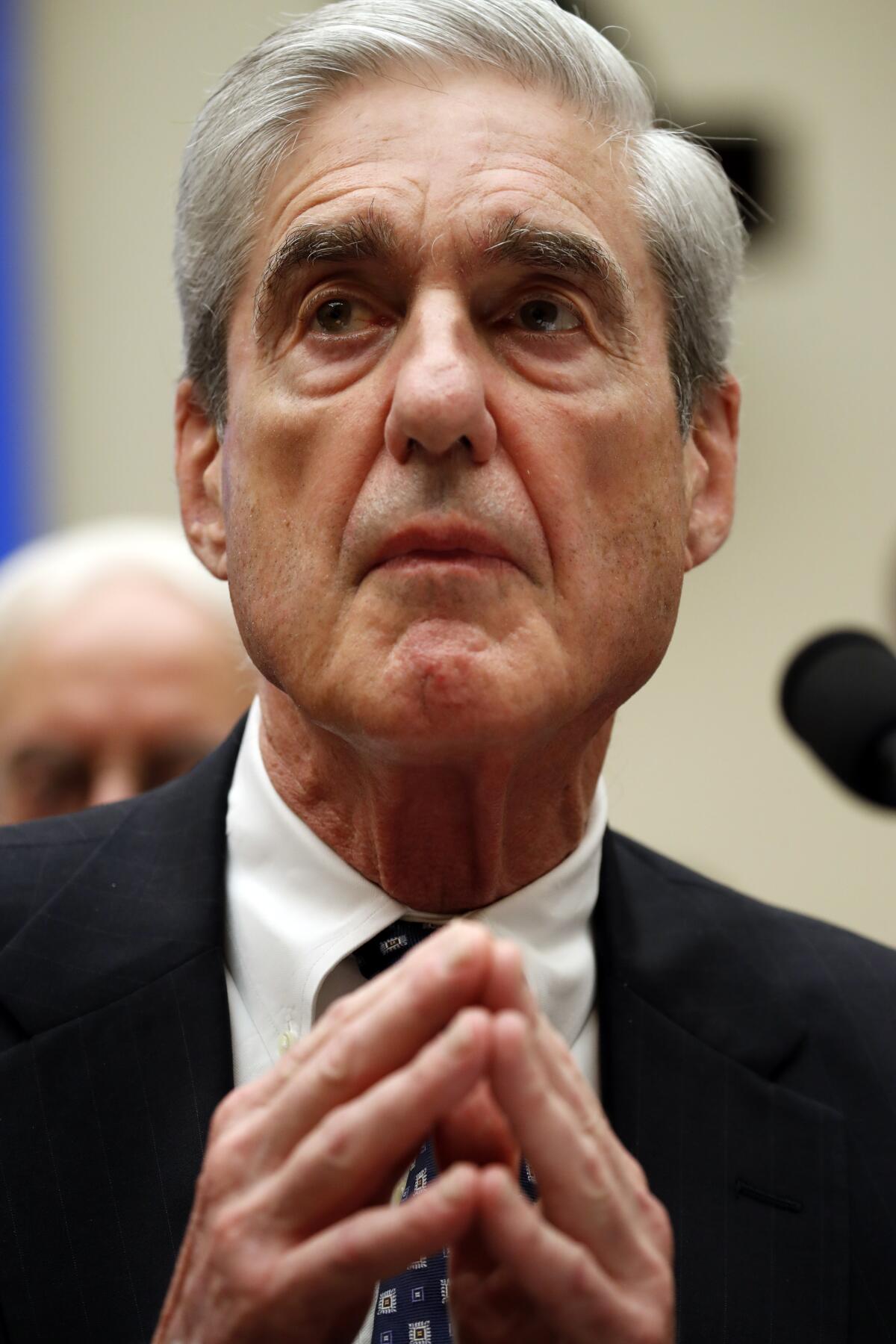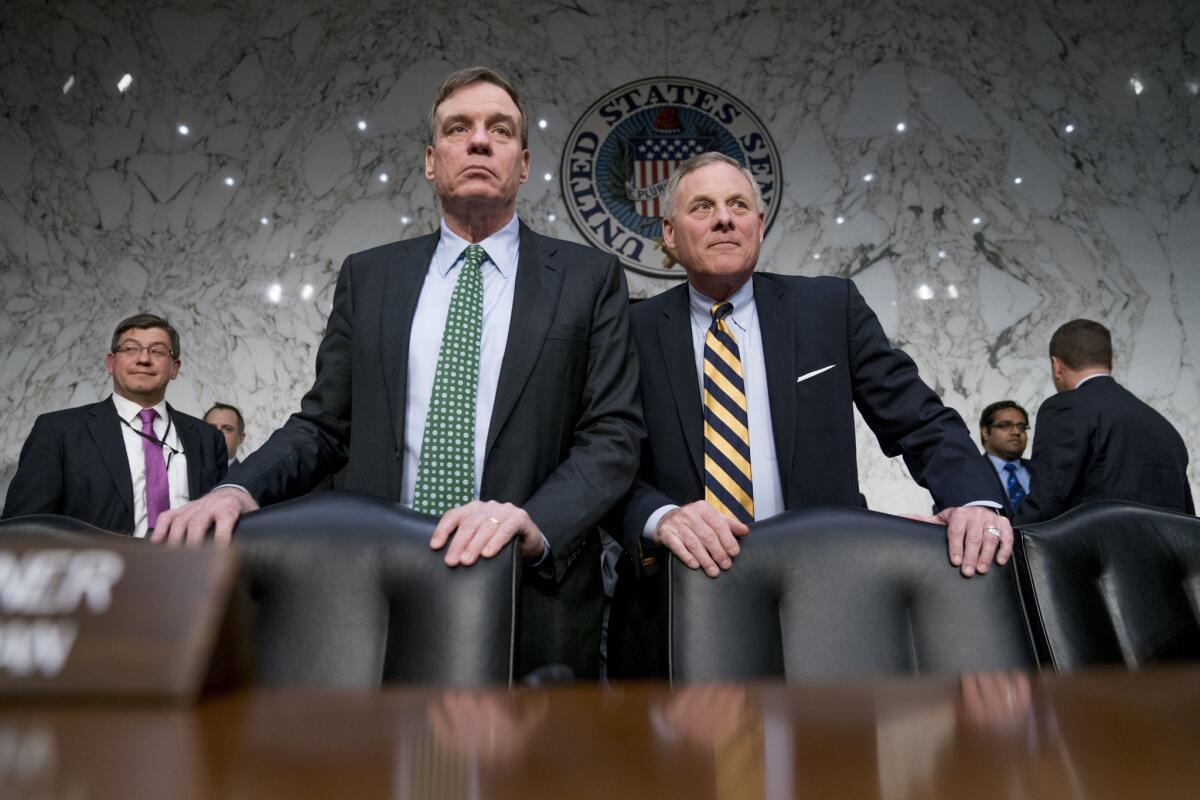Congress fails to act on warnings of foreign meddling in the 2020 election

- Share via
WASHINGTON — More than two years after Russia interfered in the 2016 election, Robert S. Mueller III warned this week of a direct threat to American democracy — a foreign government meddled in a U.S. election, it will happen again, and Congress needs to defend against it.
“They’re doing it as we sit here, and they expect to do it in the next campaign,” the former special counsel told lawmakers on Wednesday.
But with President Trump insisting that Mueller’s work is a “ridiculous hoax,” a series of legislative proposals aimed at boosting election security were bottled up in the Republican-controlled Senate on Thursday as lawmakers prepare to leave for their August recess.
Experts warn that time is running out to boost local and state defenses before the 2020 election. That message was amplified Thursday when the Senate Intelligence Committee released a bipartisan report on gaps in election infrastructure security, from voter registration to voting machines.
Some states allow voters to cast ballots electronically without a paper trail, so there is no way to check for digital glitches. Others rely on part-time workers for cybersecurity.
“There is still much work that remains to be done,” Sen. Richard M. Burr (R-N.C.), the panel’s chairman, said in a statement.
Sen. Mark R. Warner (D-Va.), the committee’s vice chairman, agreed, saying the “threat remains urgent and we have a responsibility to defend our democracy against it.”
The report notes that Russian intelligence operatives probed election systems in multiple states in 2016. No evidence indicates registration data or ballot counts were altered, but the report suggests the hackers may have cataloged vulnerabilities for future cyberattacks.

But the push for stiffer election security laws has fallen victim to the partisan warfare gripping Capitol Hill, with both sides accusing the other of bad faith.
“That’s a disgrace,” Senate Minority Leader Charles E. Schumer (D-N.Y.) said Thursday in a futile effort to call an immediate vote on proposed legislation. “It would be as if we said we don’t need a military. We don’t need ships off our shores, or planes in the air.”
Senate Majority Leader Mitch McConnell (R-Ky.) quickly blocked the Democrats’ move, however, saying Washington’s intervention in the local administration of elections needs to be carefully considered.
He slammed the proposed legislation as “a highly partisan bill from the same folks who spent two years hyping up a conspiracy theory about President Trump and Russia and who continue to ignore this administration’s progress at correcting the Obama administration’s failures on this subject.”
The Trump administration has launched some cyber operations aimed at deterring Russia from a repeat of its 2016 operation, reportedly shutting down internet access at a St. Petersburg-based troll farm that spread disinformation on social media.
Director of National Intelligence Dan Coats this month appointed a veteran intelligence official, Shelby Pierson, to coordinate election security initiatives across various agencies.
“Election security is an enduring challenge and a top priority for the [intelligence community],” Coats said in a statement.
The Intelligence Committee report says the Department of Homeland Security has improved its efforts to safeguard voting systems over the last two years.
During the 2016 campaign, the department “seemed to have little to no familiarity with elections,” the report said, but state officials said there was “significant progress” that included “increased trust and communication” during the 2018 midterm.
Trump has continued to downplay the threat.
During a meeting in Japan with Russian President Vladimir Putin last month, a reporter asked Trump whether he would insist on Moscow staying out of the next election. Trump turned to Putin and pointed a finger in his direction, saying, “Don’t meddle in the election, please.” Trump and Putin smiled at each other.
The president also sparked a bipartisan uproar when he said he would accept foreign assistance for his reelection campaign.
“It’s not an interference. They have information — I think I’d take it,” Trump said. He later backtracked partially, saying he would tell law enforcement about foreign outreach but only after seeing what information was being offered.
“If you don’t hear what it is, you’re not going to know what it is,” Trump said. “I mean, how can you report something that you don’t know?”
Mueller’s investigation concluded that Trump’s campaign welcomed Moscow’s “sweeping and systemic” operation to help it defeat Hillary Clinton and even planned some of its strategy around it.
“Over the course of my career, I’ve seen a number of challenges to our democracy,” Mueller said Wednesday. “The Russian government’s effort to interfere in our election is among the most serious.”
Asked whether the 2016 experience might encourage the acceptance of foreign influence in future U.S. elections, Mueller said: “I hope this is not the new normal, but I fear it is.”
More to Read
Get the L.A. Times Politics newsletter
Deeply reported insights into legislation, politics and policy from Sacramento, Washington and beyond. In your inbox twice per week.
You may occasionally receive promotional content from the Los Angeles Times.











